- Home
- Don DeLillo
Great Jones Street Page 6
Great Jones Street Read online
Page 6
“I knew you were there but then I forgot. I knew earlier. Opel Hampson, I thought. It’s her and she’s there. But then I somehow forgot.”
“Maybe you’d better get back over here. Or maybe if I uncovered myself.”
“I used to be such a normal boy.”
“That was before my time. That was long before I ever set eyes on your celebrated body.”
“Were you ever a normal girl?”
“When I was an itty-bitty Baptist my daddy took me to a revival meeting and I made a decision for what’s-his-name. That’s about as normal a thing as I ever did.”
“Were you saved?”
“I was drowned.”
“You mean the well-known immersion ritual.” “Immersion’s a nice word,” she said. “They grabbed me by the neck and threw me in. But that’s not when I made the decision. I was real young when I made the decision.” “How old were you when you got immersed?” “I was five or six,” she said. “They stood me up alongside the galvanized tank under the choir loft. My piano teacher had painted the River Jordan and a biblical-looking sky on a giant piece of canvas that was set on a makeshift frame behind the galvanized tank. Right nice. Real pretty sight. Then they picked me up by the neck and dunked me. When they got me on my feet again I noticed my dress had floated up around my neck, more or less exposing my entire maidenish bratty six-year-old body to every Southern Baptist thrill-seeker in the vicinity. That moment marked the true beginning of my womanhood.”
“Those were the true, real and honest days.” “On Saturday night all the boys used to go up on the railroad bridge and pee down on the passing trains.”
“Listen to Fenig,” I said. “He’s devised a new pattern.” “What’s he doing up there?” she said. “It doesn’t even sound like pacing. It sounds like he’s running around in little circles. I don’t think I like having him up there. A man who spends his evenings running in little circles. But I’ll tell you what I really don’t like. I don’t like not liking him. I never used to be this way. I used to have shadings. Now I’m all one thing.”
Opel had spent a year at Missouri State Women’s College in Delaware, Texas. This fact was all I knew about that year. She’d led a scattered life and saw no reason to elaborate on content. It was enough in her view to present titles, headings and selected prefaces. Her past was such that these did the necessary work. When I met her, in Mexico, she’d just completed two years in New York. All I ever learned about those years was what happened on the very first day. This was a selected preface. The very first day in New York she walked through Bryant Park to get to her hotel. It was December and a man dressed as Santa Claus sat on a bench eating a sandwich. A derelict walked across the park singing, in full voice, “God Rest Ye Merry, Gentlemen.” He seemed headed right for the Santa Claus. The Santa Claus watched him for a moment, then got up and began to run away, biting at his sandwich as he fled. Once across Forty-second Street he looked back to see how much distance he’d put between himself and the derelict. Then he ran through traffic on Sixth Avenue and disappeared. Opel gave the derelict a dime and he obligingly exposed himself.
10
SHE WROTE post cards to ten people and I went out to mail them. The cards had been bought in various timeless lands. Palms, mosques and jungle. I walked down the Bowery trying to find a mailbox. I put my hands in my pockets and moved sideways into the wind, trying to slice through, to minimize.
(A corporation word but perfect for our time.) Maybe that was the answer I needed, the one route back. So simple. To decide to love the age. To stencil myself in its meager design, A mailbox was visible through snow flurries. It was pleasant to drop the little cards in, adding ten names to the great circulatory process of delay. Simple. I might yield to the seductions of void, taking a generation with me into blank climates, far beyond any place we’d been before, chancing endless pain to our children, misbirth and aphasia, all asleep in drool. I had no idea how I might begin. It was important, I knew, never to fear the end of any line I might venture to trace. Important never to alter levels of purpose.
Never to satirize or pursue small ironies or curtsy to the one-handed clapping of the tasteful and humane. I’d have to hand myself over to the structures that defined the time. Float on its clotted oil. Become obese with power and self-loathing. How else to remake myself, to pass the point I’d found, the proportion needed and feared, nothing to nothing. Opel waited in bed, tangled among the sheets, her body labyrinthine in shrouds and pockets of sloppy linen. It was an evil thing to consider, allying myself with the barest parts of mass awareness, land policed by the king’s linguists, by technicians in death-system control, corporate disease consultants, profiteers of the fetus industry. I wondered whether I’d need a new following or whether the old would simply rearrange itself to accommodate my second coming. This was possibly the most interesting aspect of the problem. But either way I’d be the epoch’s barren hero, a man who knew the surest way to minimize.
“I hated to get rid of those cards,” Opel said. “They were so beautifully ugly.”
“What did they say?”
“They said it’s your birthday in four days and would so-and-so come over for a little ether and muscatel.”
“Thanks for letting me know.”
“I thought you’d read them.”
“I looked at the pictures.”
“You see, I thought you’d read them and that your failure to comment was an indication of tacit approval. That’s what I frankly and sincerely thought as a matter of fact. Anyway they’ll be here in four days. It’ll be the last party. Assuming everybody’s still at the addresses the cards were mailed to.”
“Nobody’s coining here in four days,” I said.
“Why not?”
“I didn’t mail the cards.”
“Lie,” she said. “I caught you in a lie. You hadn’t read the cards so there was no reason not to mail them.”
“I lied when I said I hadn’t read them. But I’m telling the truth now. I read them. But I didn’t mail them.”
“You’re too messed up to read.”
“Okay, it’s true I hadn’t read them. But I suspected what was written on them. So I didn’t mail them.”
“Not even remotely convincing.”
“I gave them away. There was a beggar over near Stanton Street. I gave him the post cards to sell for black bread and soup. The beggar then revealed himself to be a sixteenth-century English saint. Nigel of Chelsea. He gave me his credit card to use for thirty days without fear of criminal prosecution.”
“I always know when you’re lying regardless of what comes out of your mouth. You become very still. And your eyes get hard. You try to overpower the person you’re lying to. When I lie I try to slip past like a little stream. But you, you’re like Easter Island.”
“Tell me who’s showing up for the last party.”
“Oh, everybody.”
“Can you give me an example?”
“Oh, you know, everybody.”
“Bright lights of the past. Is that it?”
“The neon creepies.”
“Opel, shit.”
“They’re just folks, Bucky.”
I slept with my head somewhere under her arm. When I woke up it was nearly dark. Opel never appeared peaceful in sleep. There were other times, certain expressions she made, when I could see exactly what she’d looked like at the age of ten; this funny child smiled out from the middle of her face. But in sleep she was faintly angry, twice her true age, laboring through dreams and panic, a menopausal line coursing down her jaw. Sleep drained her of impulsiveness and failed to replace it with some approximation of its opposite, serenity or resignation. Opel did not rest easily. She was a bed-fighter, kicking, angling for position, making carnivorous noises. The trance was a kindlier state for her. In the past we’d cruised together into various distorted modes and she never failed to evolve security from a chemical’s endless suburbs. She belonged dead center in that ferocious calm; it stea
died her as sleep never could. I woke her up now and made love with whatever strength I could summon, whatever bruising resolution, a fresh edge to body and mind, drawn from that walk in the wind, power-resurgent-now, teased by the feeling I might soon return to the sound outside. Her body gave me back the heat of sleep, responding slowly, no longer greedy in its freedoms, a body rising like bread, her loins poised, tongue at my ear, hand knuckling along my spine, and it was art we sought to shape, a moral form to master commerce, the bodies we were and the danger we needed, that of dredging each other’s insufficiencies, touring the deepest holes. We rode an odd moment now, laughter back and forth, her eyes alert to love’s delight, an instant only, then down to pelvic business, rack and pinion, the poet’s word dropping off the page. Through the day Opel remained in bed, resting up (she said) for her mercantile encounter. I dialed numbers on the dead phone.
“Why is ecology so boring to read about?” she said.
“For the same reason destruction is such fun.”
“Old magazines are pretty. Don’t you think?”
“Sure, why not.”
“This one says Spain is a land of contrast. I’ll have to go there soon.”
“It may not be timeless enough for you.”
“Right now I need contrast. The eye gets tired as hell seeing the same surroundings. That’s the second and final justification for travel as a matter of fact. To keep the eye interested.”
“What’s the first?” I said.
“To become a thing. I told you that.”
“But is there any land that isn’t a land of contrast?”
“I don’t know. But Spain makes an outright claim. If you went somewhere where they didn’t make the claim, you’d be taking a big chance. You might get there and find no contrast at all. No, it’s definitely Spain. I’m going to Spain.”
“Spain,” I said into the phone. “Get me the Spain the tourist never sees.”
“When are you getting out of here, Bucky? Don’t you want to make some sounds? You haven’t written anything, you haven’t played, you haven’t even hummed. What the hell, man.”
“What the hell, man.”
“You should be playing.”
“You should be dealing,” I said. “Where’s your man? If your man doesn’t show up, where are you then? You’ll have to go back to Texas and manage your daddy’s empire. You want to deal, that’s dealing. Why’d you ever leave? Come up here in this freezing gray slush. Hang around in that little bed waiting for some long-time weird geek bureaucrat to drive up in his pimpmobile and knock on your door. It makes no sense.”
“Could be you’re right. But I know one thing. My eyes need contrast.”
“Spain,” I said into the phone.
Several days later people of various sorts appeared in the room. Some I knew; others were unknown to me. I sat in the bowl-shaped canvas chair. Opel led the celebrants around me. I nodded, blinked and occasionally touched another’s jutting hand. I had little to say but was sure no one would mind. They already knew my voice. It was my presence they were eager to record, the simple picture of man-in-chair, a memory print to trade for other people’s time. Slowly the room began to fill. It became obvious the original ten were intent on trebling. People spoke of where they lived, in what shamble of rooms or post-atomic street. Of their health, poor and poorer. Of bands of howling boys abroad in NoHo. Of distant spring on the banks of the East River, stoic picnickers watching bodies rise to the surface, braided in weed and pecked by idle fish. Someone mentioned the loft he’d just moved into, a large windy place, floors buckled and humped, no lights without a kite and key. Of teen-age wino communes. Tia Maria modeled (draped) for art students at Cooper Union. Chester Greenlee panhandled on Eighth Street, wearing a Mickey Mouse mask. Miss Mott lived alone on Mott Street, as in the past, called Miss Rivington, she’d lived on Rivington Street, and on Canal Street as Miss Canal. She was in her late sixties (it was speculated), a collector of Dad’s Root Beer bottles and copies of the Wall Street Journal. 1 took a breath and then another. A man smoked a pipe, sitting with legs jauntily crossed, dressed in patched corduroy. The neon creepies chatted and wept, bad teeth, worse posture.
“This is the last party.”
“Look, I’m wearing my forty-dollar chinchilla Luv Glove. It’s a gesture. We need gestures today. People’s stomachs are shrinking with fear. We need to wear each other’s underwear. I issue this edict. Wear each other’s underwear. It’s a gesture of faith in each other. It’s the end of fear.”
“Oh God my head. Oh my whole mind. My limbs and extremities. Oh God my hair, my nails, my pores.”
“I’m troubled by movie dreams. Glamorous faces appear and disappear. All the great names. I find it troubling for some reason. I wake up fearful and unsettled. The faces are sad. Maybe that’s it. The sadness of great fame. The famous movie dead. Dead but not dead. That’s why I’m unsettled maybe. Because they’re unsettled. Dead but not really dead. Never really dead. The whole concept of movies is so fundamentally Egyptian. Movies are dreams. Pyramids. Great rivers of sleep. The great and the glamorous with their legendary sphinxlike profiles. I wake up trembling.”
“This is the last party.”
“I was all set to wear my sequined baby-doll nightie from Frederick’s of Hollywood and come crashing out of a big freaky birthday cake. But I settled for the Luv Glove. Nobody makes gestures today. We’re all scrunched up like piglets being born. Opel, mail me some underwear so I’ll feel better. Yours and Bucky’s. Lycra, mail Bucky your underwear, one or two things. It’s a gesture of faith. People need each other. I issue this edict. A chain letter with underwear enclosed. Everybody who gets the letter mails one pair of underwear to the next name on the list. If nobody breaks the chain, we end up with sixty-four pairs of underwear each. Of and for the people. I’m pro-people. This is a people thing.”
“Of course I act like a child. Of course I revert. Of course I’m anal.”
“Burnt skin, Opel, use mink oil soap. And your hair looks like an Arab’s been chewing on it. Use a comb to style. Use a brush to condition. And rinse with Jell-O, sweetmeat.”
I continued to breathe, never before conscious of the effort needed to generate this act. People passed supernaturally across the room, leaving contrails of smoke and scented ash. Others settled around me, moving their lips. All were breathing, sullenly pumping blood, embarked together on a perverse miracle. Our movable parts carried us past the edge of every deathly metaphysic. Our organs, lifted from our bodies, plucked out with silver pincers and left laboring on bright Tiffany trays, would comprise the finest exhibit of our ability to endure. Euphoric with morphine we’d be wheeled among them, noting proportions and contours, admiring the beauty of what we were. In death, our opened bellies dripping, we’d be placed in refrigerated elevators and sent soundlessly into the earth. Above, our organs would be tagged and stored. Or, if found defective, fed to the poor.
“It’s axiomatic that history is a record of events. But what of latent history? We all think we know what happened. But did it really happen? Or did something else happen? Or did nothing happen?”
The pipe-smoking man crossed and uncrossed his legs, a shade of vaudeville in the genealogy of his movements. He banged the pipe into an ashtray, inspected the bowl, blew into the stem, inserted a grimy pipe cleaner. Around him people spaced from birth passed chocolate kisses hand to hand. The pipe-smoking man began to refill his pipe, treating the instrument with appropriate manly endearment.
“I’m Morehouse Professor of Latent History at the Osmond Institute. But I don’t occupy the Morehouse Chair. I occupy the Houseman Chair. This professorship deals with events that almost took place, events that definitely took place but remained unseen and unremarked on, like the action of bacteria or the rising and falling of mountain ranges, and events that probably took place but were definitely not chronicled. Potential events are often more important than real events. Real events that go unrecorded are often more important than recorded
events, whether real or potential. At one time sixty per cent of the population of black Africa was white. We have tools and femurs. But we’re not sure what happened to this blue-eyed race. Were they wiped out by wars and disease? Did they sail away in long wooden ships? We’re still sifting materials at the Homer Richmond Blount Memorial Wing of the Institute and we hope to have some answers very soon. One of the major thrusts of latent history is to avoid a narrow purview. We’re presently assembling evidence about the French Revolution indicating that a dissident faction of the sans-culottes used to assemble secretly under cover of dark for the sole purpose of wearing culottes. They’d strut around all night in foppish knee breeches. An orgy of strutting and posturing. At daybreak they’d get into tight-fitting pantaloons and go back to their revolutionary activities. History is never clean. In some cases less happened than we suspect. In other cases we merely suspect that less happened. It’s axiomatic that people in the Middle Ages went to bed early. We’re studying this to learn what effect it had on the Hundred Years’ War dragging on for as long as it did. Latent history never tells us where we stand in the sweep of events but rather how we can get out of the way. I myself am currently doing a paper proving that the Reformation, as such, never took place. The Counter Reformation was a response to something that never happened, as such. The Nile once flowed into the Amazon. We have sediment to prove it. What dreams did it carry? How much of the blood and poetic impulse of all of us? These are among our central concerns at the Institute.”
Lloyd Boyd stood in the doorway, then spotted me and came over. Lloyd was an actor who’d recently served time on a charge of reckless endangerment. Since his release he’d been living in Grand Central Station, sleeping on benches or in the doorways of clam bars. He told me he tried to think of Grand Central Station as his apartment. One room but a nice size. High ceiling. Nice big window. Marble floor. Centrally located, always important for an actor making the rounds. A little bit noisy and could be more heat. But the high ceiling made up for everything.

 Great Jones Street (Contemporary American Fiction)
Great Jones Street (Contemporary American Fiction)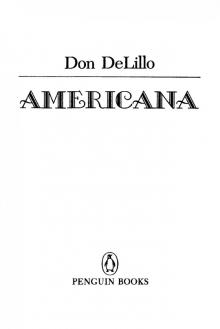 Americana
Americana Running Dog
Running Dog Libra
Libra End Zone
End Zone Ratner's Star
Ratner's Star Underworld
Underworld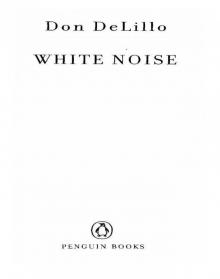 White Noise
White Noise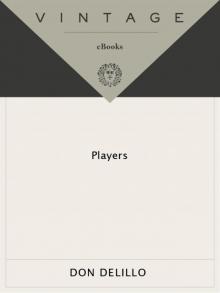 Players
Players Cosmopolis
Cosmopolis The Silence
The Silence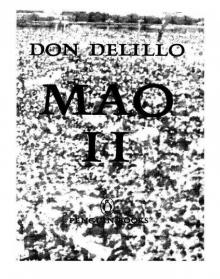 Mao II
Mao II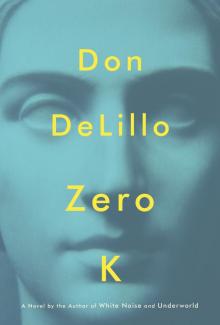 Zero K
Zero K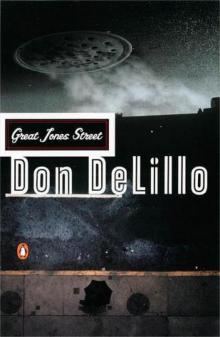 Great Jones Street
Great Jones Street The Angel Esmeralda
The Angel Esmeralda The Names
The Names The Body Artist
The Body Artist Point Omega
Point Omega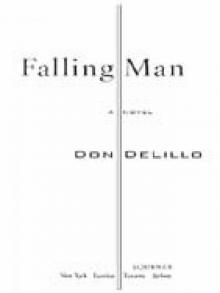 Falling Man
Falling Man